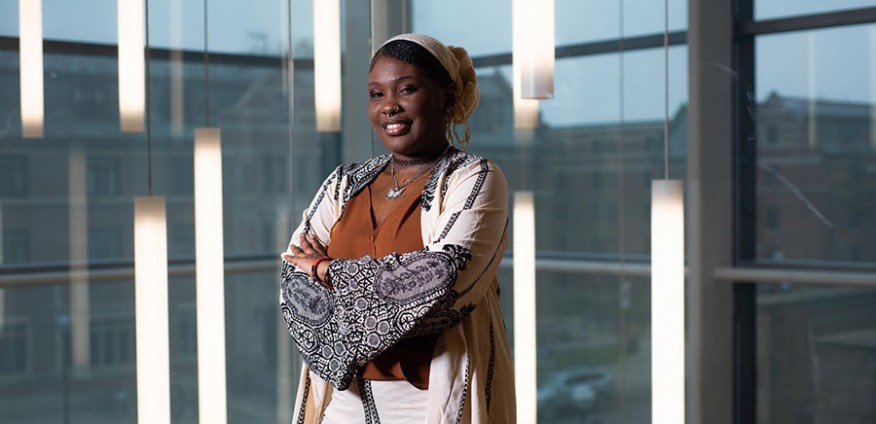-
Pathway:Global Social Work Practice
“I was not even thinking of a master’s!” says Jenika Scott, MSW student. “I'm first gen – last child in my family and the first to get a bachelor’s. I thought a master’s degree was beyond me.”
Scott was born in Georgetown, Guyana and came to the United States in 2016. She attended Rutgers University in New Jersey and graduated magna cum laude with a degree in political science and international relations, and with high honors on her thesis. During her undergraduate career, she was a McNair, Education Opportunity Fund and Paul Robeson Scholar, a member of multiple honor societies, and a winner of the Chancellor’s Provost Leadership Award.
These honors, though, were hard won. “Many times I placed my mental health on hold because people were counting on me,” Scott says. “Mental health is stigmatized in Guyana and the Caribbean. You just bottle it up and push on – the rhetoric of the strong Black woman. So during undergrad, I did little things to help me feel empowered. I wore crowns all the time. People were like, ‘What is wrong with you?’ I'm like, ‘This is what makes me feel empowered today, so this is what I'm going to do!’”
Social workers must conduct these difficult conversations, so I constantly push myself to be in these spaces. Performing in Forum Theater was so empowering.
Then came the question of what Scott would do next. “I was interested in people-centered work and community change,” she says. “So, what graduate school did that?”
Scott dove into research and discovered the U-M School of Social Work and its global pathway. "This was what I wanted!” she says. “Social welfare, social development, and conversations on policy and evidence-based practice. I was a social worker at heart; I just didn't know it. I applied and got in, and I was screaming!”
The School offered many opportunities that aligned with Scott’s passions. She serves on the Student Union and has also served as an assistant researcher, which allowed her to present at a “glocal” event (i.e., one characterized by local and global considerations). She will also do a policing-and-refugees training. And she recently authored a blog post addressing the problem of political bullying rhetoric.
In addition, Scott participated in Forum Theater, a workshop that uses theater arts to start conversations about diversity, equity, and inclusion. “Forum Theater helped me personally and professionally,” says Scott. “Social workers must conduct these difficult conversations, so I constantly push myself to be in these spaces. Performing in Forum Theater was so empowering.”
Scott’s field placement is with the Michigan Immigrant Rights Center in Ypsilanti, where she helps find affordable services for unaccompanied children becoming U.S. citizens. Scott also works with Drive Michigan Forward, helping restore driver's licenses to undocumented Michiganders. Driving legally allows them to apply for jobs, attend school, and engage in other activities that require proof of residence. “All this helps with people’s dignity and freedom,” she says.
This summer, Scott will travel to India with her fellow global pathways students. “We'll go into villages,” she says, “where I will get to do international development and instructional design.” In the latter field, Scott has been inspired by the flexibility and support at SSW. “I didn't find an instructional design class at U-M,” she says, “so I worked with the School to create one. You can make the Michigan program whatever you want!”
Once, Jenika Scott could not imagine earning a master's degree. Now, she is looking beyond one: “I want to do research,” she says, “maybe at the PhD level, and I want to do development in an international space. I want to travel and advocate for communities. Women and youth would be my demographic. But I'm open to whatever experience there is.”
